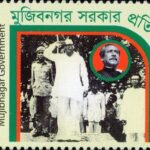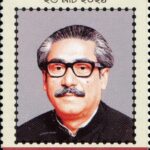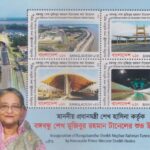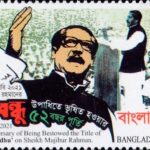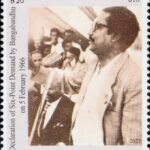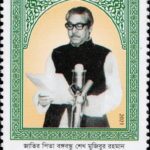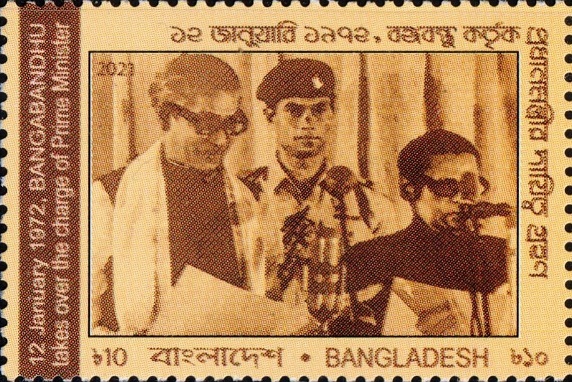
Bangabandhu as Prime Minister of Bangladesh
A commemorative postage stamp on Bangabandhu Sheikh Mujibur Rahman takes over the charge of Prime Minister on 12 January, 1972 :

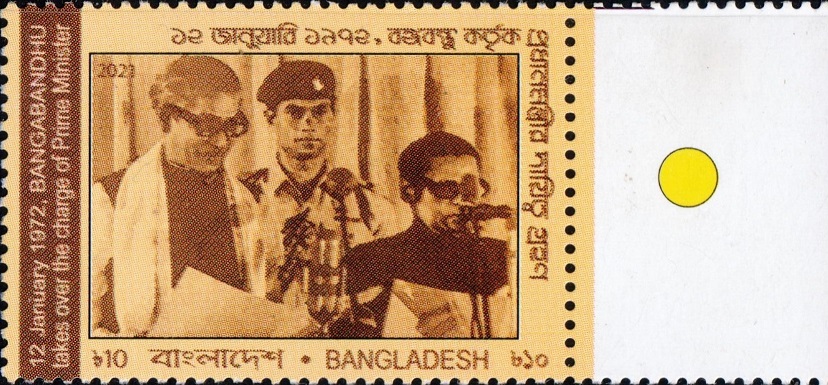 Issued by Bangladesh
Issued by Bangladesh
Issued on Jan 12, 2021
Issued for : On this issue, Bangladesh Post has issued a Commemorative Postage Stamp of denomination of Tk. 10, a First Day Cover of Tk. 10, a Data Card of Tk. 5.00 and a Special Canceller.
Designer Stamp & FDC : Mr. Sumanto Kumar
Designer Canceller : Mr. Sanjiv Kanti Das
Type : Stamp, Mint Condition
No. of Stamp : 01 (One) Pcs
Colour : Multicolour
Denomination of Stamp : Tk. 10/- (Ten)
Size of Stamp : 32 mm x 48 mm
Perforation of Stamps : 12.5
Qnt of Stamps : 50,000 (Fifty Thousand) pcs
Process of Printing : Offset
Printer : The Security Printing Corporation (Bangladesh) Ltd., Gazipur-1703
About :
- When the Pakistan Army in the dark night of 25 March, launched “Operation Search Light” against Bengali civilians, intelligentsia, students, politicians, armed personnel and started the worst, hellish and devised genocide of the 20th century, the Undisputed Leader of the Bengali (Bangalee) Nation, the Greatest Bengali (Bangalee) of all time, The Father of the Nation Bangabandhu Sheikh Mujibur Rahman proclaimed the independence of Bangladesh through the wireless of the then EPR at the first hour of March 26, 1971. Right after the proclamation of independence Bangabandhu was arrested and flown to West Pakistan and kept in a prison there.
- After the proclamation of the independence of Bangabandhu, Mukti Bahini (the Freedom Fighters also called as Liberation Army and Bangladesh Forces) was formed. Indian and Bangladesh forces were put under a joint command structure led by Lt. Gen. Jagjit Singh Aurora and this force came to be known as Mitro Bahini (allied force). Mitro Bahini provided training, arms, ammunition and combat tactics to freedom fighters. India joined the Bangladesh Liberation War on 3 December 1971, after Pakistan launched “Operation Chengiz Khan” (Pakistan launched pre-emptive air strikes) on North India. With air supremacy achieved in the eastern theatre and the rapid advance of the Indian and Bangladesh forces toward Dhaka, Pakistani Army compelled to take decision to surrender. On 16 December 1971 at the Ramna Race Course garden in Dhaka Lieutenant General Amir Abdullah Khan Niazi, Martial Law Administrator Zone-B and Commander, Eastern Command (Pakistan) surrendered to Lieutenant-General Jagjit Singh Aurora, General Officer Commanding in Chief, India and Bangladesh forces in the Eastern Theatre. On behalf of Bangladesh, Group Captain A. K. Khandker acted as witness to the surrender. Over 93000 Pakistani troops surrendered to India and Bangladesh forces making it the largest Surrender since Second World War. Under the indomitable, undaunted, persevering, courageous, brave and vigorous leadership on 16 December, 1971 a sovereign and independent state – Bangladesh manifested in the world map.
- The Government of Pakistan was forced to release Bangabandhu Sheikh Mujibur Rahman on January 08, 1972 under immense international pressure. On January 08, early in the morning a PIA Boeing took Bangabandhu Sheikh Mujibur Rahman to London. The then President of Pakistan Zulfiqar Ali Bhutto saw Bangabandhu off at the Rawalpindi airport amid safety. On that very day, Bangabandhu traveled to London on his way to Dhaka. On January 09, Bangabandhu met the British Prime Minister, Edward Heath. Prior to returning to Dhaka, Bangabandhu stopped over at Delhi, where the Indian President V.V. Giri and Prime Minister Indira Gandhi along with others welcomed with grace. When the Father of the Nation Bangabandhu Sheikh Mujibur Rahman reached Dhaka on January 10, 1972 millions of jubilant citizens of the newest country in the World welcomed him with open Arms, who were eagerly waiting for his return. On January 12, 1972 Bangabandhu Sheikh Mujibur Rahman took charge as the Prime Minister of the Government of the People’s Republic of Bangladesh and embarked on the reconstruction of a war-ravaged country.
- Bangabandhu Sheikh Mujibur Rahman left behind an eternal legacy of magical, great phenomenal and strong leadership and statesmanship. The legacy of Bangabandhu will live on forever.
- Narrator:
Shafiee Billah Jabber
Son of Martyred Intellectual Abdul Jabbar of Bangladesh Liberation War and
Author of the Trust: Martyred Intellectuals’ Memorial Trust, Bangladesh.
Editor and Publisher: The Daily Asian Express and Fortnightly City of Joy.


